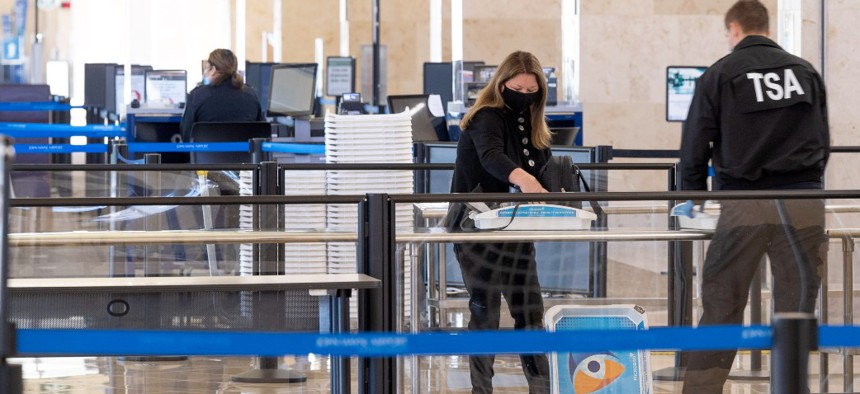Biden’s 2023 Budget Would Pay for TSA Raises and the Move to General Schedule
The Transportation Security Administration has begun the process of granting its employees full federal civil service rights, although it needs more than $1 billion in additional funding to end the pay disparity with General Schedule workers.
The Transportation Security Administration is set to receive a big influx of new funding as part of President Biden’s fiscal 2023 budget request in order to finally begin paying its employees equitably when compared with most other federal workers, and not all of that money is in the form of new spending.
Since the agency’s inception following the Sept. 11, terrorist attacks, TSA has had wide latitude to develop its own workforce policies. As a result, TSA screeners have seen much lower pay than their counterparts elsewhere in government, as well as a lack of union and due process protections, with abridged collective bargaining rights only being granted in 2011. The agency has seen consistently higher turnover and lower morale than most other federal agencies.
For years, Democrats in Congress have pushed, unsuccessfully, to pass legislation that would make TSA workers Title 5 employees like most of the rest of the federal workforce. But last year, Homeland Security Department Secretary Alejandro Mayorkas instructed TSA Administrator David Pekoske to act administratively to align his agency’s personnel system with that of Title 5.
And while some elements of that transition are already underway—TSA reached a deal with the Merit Systems Protections Board last fall to allow the semi-judicial body to review workers’ appeals of disciplinary and removal actions—the agency will need a lot more money to pay its workforce equivalent to General Schedule salaries.
Biden’s fiscal 2023 budget proposal would increase funding for TSA pay and benefits by $1.6 billion compared with the 2021 enacted level—to a proposed total of $7.1 billion—so that the agency can complete that implementation.
“By establishing salary parity with other federal employees, the budget addresses retention issues faced by the Transportation Security Officer workforce, improving service delivery,” the White House wrote. “The budget also supports expanding TSA workforce access to labor benefits such as collective bargaining and merit systems protections. These enhancements support the president’s commitment to fostering diversity, equity and inclusion in the federal workforce.”
According to a budget document published by the Homeland Security Department, changes to TSA’s personnel system alone will cost $870.9 million in fiscal 2023, although it describes the initiative as “essential” to the agency.
“Customs and Border Protection officers are paid nearly twice that of Transportation Security Officers at their full performance level,” the department wrote. “The lack of equitable compensation in this area, compounded by years of insufficient pay progression, impedes TSA’s ability to meet mission requirements in the recruitment and retention of employees. Appropriately compensating TSA employees is essential to improving the morale and retention of these essential employees and building upon the overall employee experience at TSA.”
An additional $121.2 million would go toward providing employees with full collective bargaining and civil service protections, which the department said will allow for the hiring of additional attorneys to handle workforce issues and “expedite staffing arbitration claims and reduce disputes” with the union.
Reps. Bennie Thompson, D-Miss., and Peter DeFazio, D-Ore., proponents of moving the TSA workforce to Title 5, said the way the budget funds these initiatives also fixes some of the agency’s funding stream. It would end the diversion, which began in 2013, of one-third of revenue collected from airline passenger security fees to pay for unrelated spending elsewhere in the federal government. In fiscal 2019, $1.36 billion in user fees were diverted away from TSA in this manner.
“Today marks a first for TSA’s frontline workforce: under the president’s budget request, the agency would receive a significant funding increase to pay for raises for its workers and expand collective bargaining rights,” they said in a statement. “Better yet, funding this proposal would not come from increasing fees. Instead, TSA would be able to use all the security fees it collects when travelers book a ticket—something many congressional leaders on both sides of the aisle have long championed. Under this proposal, TSA’s over 60,000 employees—who make up one of the lowest paid, most diverse workforces in the federal government—would finally get the pay they deserve after keeping our skies secure and manning the frontlines for over two years of a pandemic.”






